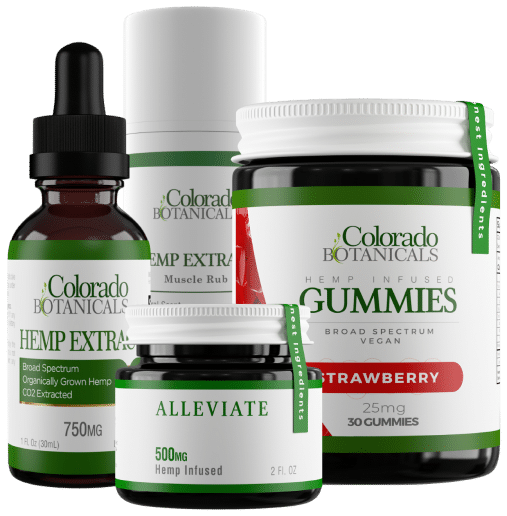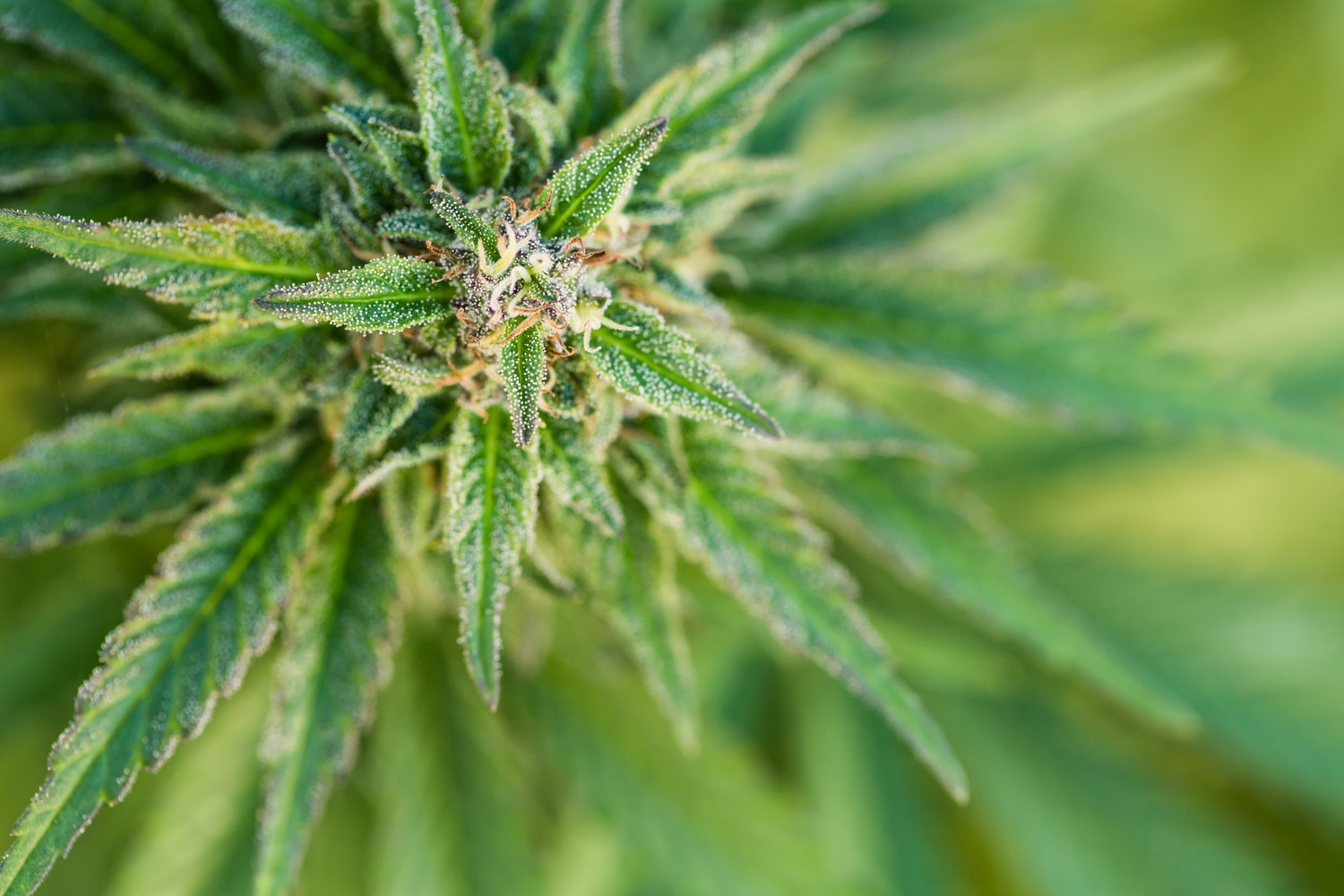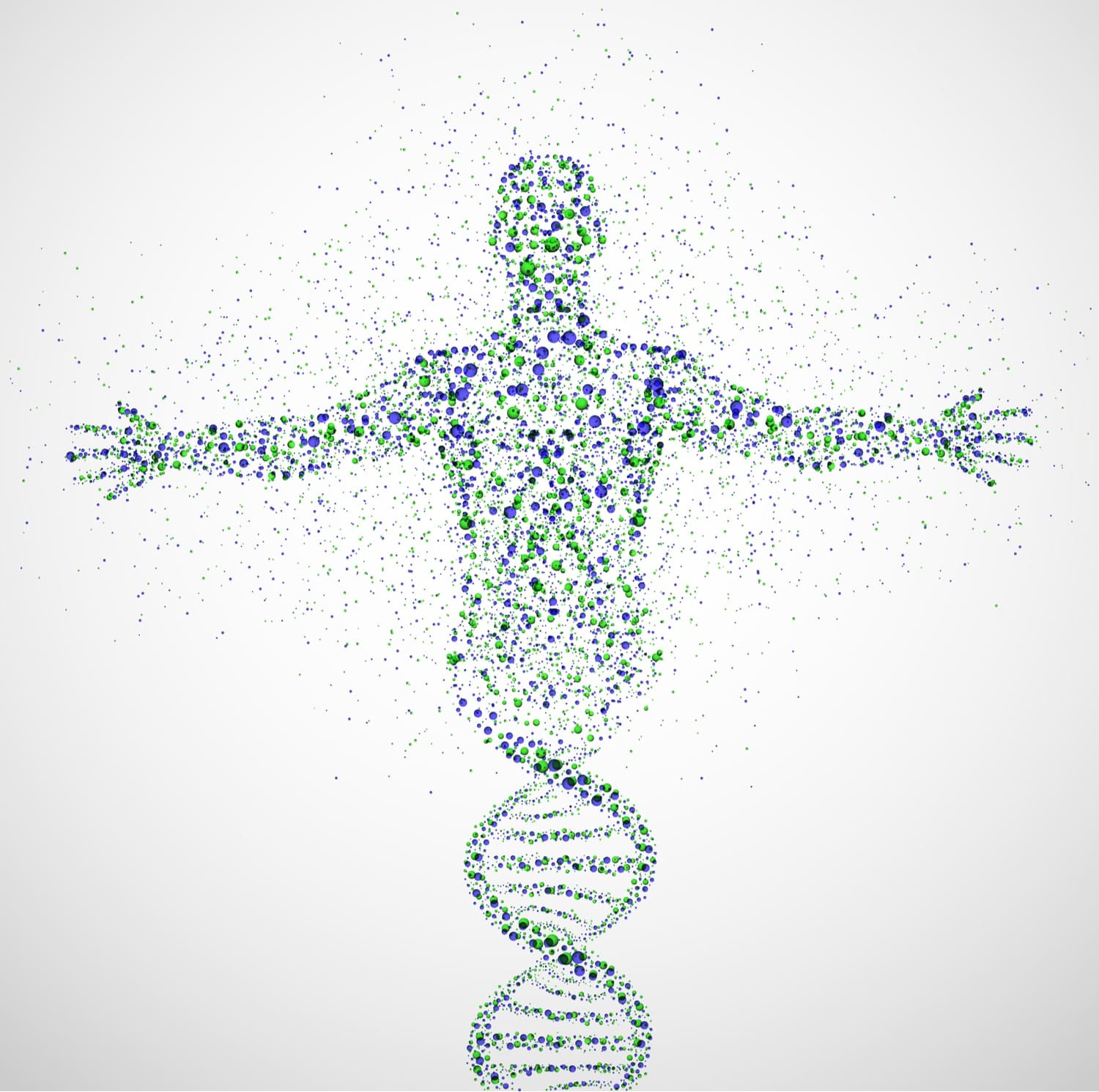As CBD becomes more widespread and accepted, it’s raised many questions on if CBD will show up on a drug test. Given CBD’s association with cannabis, many make the mistake of connecting CBD with marijuana.
So does CBD show up on a drug test? What about if CBD oil shows up on a drug test? The answer is a bit complicated.
How CBD oil affects a drug testing screening mainly depends on the type of CBD product, but there’s a lot more to unpack. Let’s take a look at how CBD can affect a drug test and if you can fail.
Does CBD Show Up On A Drug Test?
Yes, CBD can show up on a drug test, but that’s only if the drug test screening tests for the cannabinoid CBD. However, that’s never heard of because it’s not something employers or law enforcement look for by default. Drug tests are designed to look for illicit substances, like THC, narcotics, steroids, etc.
Since CBD is federally legal and doesn’t impair or artificially improve athletic performance, there is no reason organizations need to test for CBD. It would be a waste of time and money.
Does CBD Oil Show Up On A Drug Test?
While CBD itself doesn’t trigger a drug screen, the CBD oil you use might do so. In this case, the issue isn’t CBD, but if THC is present or not. Some hemp CBD extracts, such as full-spectrum CBD oil, contain up to 0.3% THC that a drug test may show positive for THC.
However, don’t worry because you can easily avoid that awkward situation if you choose a broad-spectrum CBD oil.
How to Not Fail a Drug Test Using CBD Oil
Since CBD isn’t a concern, the issues about drug testing come from any THC your oil might contain. While hemp CBD extracts can legally carry up to 0.3% THC, there are plenty of THC-Free options.
THC content – if any – depends on the CBD oil you choose. There are three possible options:
- Full Spectrum
- Broad Spectrum
- CBD Isolate
All of these CBD products differ in fundamental ways.
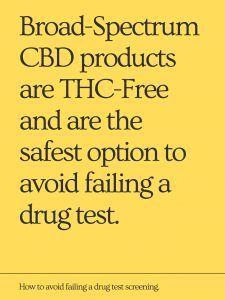 Full-Spectrum
Full-Spectrum
Full-spectrum (“whole-plant”) CBD oil is the densest option. Manufacturers try to extract and retain all the cannabinoids and terpenes from the host plant. Granted, a significant amount is lost during extraction, but the diversity remains.
Having so many other critical compounds is vital for the “entourage effect” – a synergistic relationship where cannabinoids and terpenes complement each other. The process helps increase CBD oil’s potency.
Unfortunately, full-spectrum contains up to 0.3% THC, so it’s best to avoid these types of CBD products if you don’t want to risk failing a drug test.
Full-spectrum extracts also carry the complete flavor profile of their source plant. Many people like it, but for some, the “hempy” taste is hard to overcome, even when mixed with food or drinks.
CBD Isolate
CBD Isolate is the complete opposite of full spectrum. While the latter extracts and keeps as much as possible, the former is processed to remove everything but CBD.
Although this leaves behind a product that contains up to 99.9% CBD, don’t let these numbers fool you. Isolate may offer incredibly high purity, but the lack of terpenes and other cannabinoids wipes out the critical entourage effect.
Consequently, isolates are less effective than full-spectrum.
But it’s not all bad news. Many people prefer isolates because they contain no THC. They’re also flavorless, making it easy to mix with juice, smoothies, dressings, and more. Flavor-focused vendors may also prefer isolate in their edibles.
Broad-Spectrum
Broad-spectrum CBD oil is a happy medium between THC-laced full-spectrum and THC-free (but rather hollow) CBD isolate.
Like full-spectrum, the broad-spectrum oil extraction process aims to keep every cannabinoid and terpene except THC, making it THC-Free. With compounds to fuel the entourage effect and no THC to trigger a drug test, broad-spectrum offers the best of both worlds.
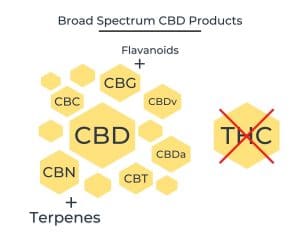
Admittedly, you’ll still notice the “hempy” flavor. But it’s a small price to pay for being able to have your cake and eat it too.
So the best way to pass a drug test when using CBD oil is to avoid products with THC. Sounds pretty straightforward, but this is where “buyer beware” should always be at the back of your mind.
Unfortunately, the CBD industry’s lack of regulation means labels can still be deceiving. When shopping around, you have to keep a sharp eye on minor details. We’ll cover these tips and tricks shortly.
For now, let’s see why THC could still make its way into allegedly “THC-free” products.
Factors That Can Lead to A Positive Drug Test with CBD Oil
Even if you choose a THC-Free product, that’s no guarantee. A company can follow the correct extraction process yet still ship a product with detectable levels of THC.
There are three main ways this can happen.
Using A CBD Product That Has THC
Using a CBD product containing THC, such as full-spectrum CBD, is the most common way to fail a drug test. Despite THC being found in minor amounts, it definitely can trigger a positive for THC.
Many manufacturers still claim their products are THC-Free when they do, so it’s crucial to buy CBD from a reputable company.
Mislabeling of CBD Products
Mislabeled CBD products were (and likely still are) a huge issue. When the Food and Drug Administration tested several CBD products, about 70% contained more or less CBD than advertised, while some didn’t have any CBD.
Even worse, many of these products “contained a significant amount of THC.” This is a huge problem considering CBD oil is famous for treating certain forms of childhood epilepsy. Inadequate or deceptive labeling means some parents could be accidentally giving THC to their kids.
You’re also going to have a hard time telling an employer that you consume no more than 0.3% THC when a drug test seems to say otherwise.
Cross-Contamination
With cannabis being semi-legal in the U.S., you’d think this is a positive thing for hemp and “marijuana” advocates. However, it’s proven to be a double-edged sword – and complete nightmare – for hemp producers.
There’s a massive issue with having high-THC and low-THC cannabis chemovars growing in the same state. The layout often leads to cross-pollination, affecting THC levels of industrial hemp.
Hemp farmers have no choice but to destroy any crops exceeding 0.3% THC. If producers don’t consistently test their plants and products, you could receive something with substantially more THC.
How Can You Make Sure That a CBD Product Doesn’t Contain THC?
The best way to make sure that a CBD product doesn’t contain THC is to inform yourself. Checking for THC is easy if you know where to look. Once you know what makes a good CBD product, buying your first one will be a breeze.
Check the Label
Check the label to see if the CBD product is full-spectrum, broad-spectrum, or pure CBD isolate. If it mentions “CBD” but does not mention if it’s full-spectrum or broad-spectrum, then it’s most likely a CBD isolate.
For the most effective results, purchase broad-spectrum CBD over CBD Isolate for the very reasons we talked about earlier.
Also, purchasing broad-spectrum won’t have you asking, “Does CBD show up on a drug test” as it’s THC-Free while containing a spectrum of other cannabinoids and terpenes.
Check Third-Party Lab Reports for THC
Third-party lab reports are a must-have before you buy from a CBD company. Having no lab reports is a huge red flag. Never buy from a company that doesn’t prove what they’re selling.
Full-spectrum results shouldn’t show any higher than 0.3% THC. Isolate and broad-spectrum should show non-detectable levels of THC or “ND.”
Tests are typically categorized by batch and product, so it’s easy to find the information you need.
Below is a picture of a third-party lab report on a full-spectrum CBD oil. As you can see, it contains THC.
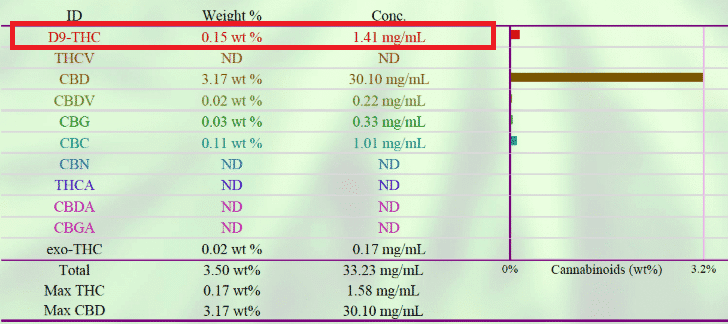
Below is an image of a broad-spectrum CBD oil. As you can see, it contains non-detectable levels of THC while containing other cannabinoids, fueling the entourage effect.
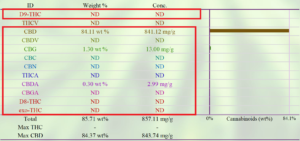
Buy from a Reputable Company
For the most part, CBD is an untamed land. We have to have faith that the company we buy from is honest about being “the best.” Of course, this is impossible to quantify or prove, so to truly find the right source, you need to read between the lines.
A reputable CBD company offers some key signs of quality. They don’t all have to be there, but enough to create a well-rounded, potent, safe, THC-free CBD oil.
When you research, look for the following:
- Updated Third-party lab reports
- CO2 extracted
- USDA Certified Organic or “organically grown”
- No chemical pesticides or herbicides
- Grown locally or in-house
- Sustainable farming
- THC-Free
How Much CBD Will Make Me Fail a Drug Test?
No amount of CBD will make you fail a drug test unless that test is modified for CBD. The real issue is whether your product contains THC.
A CBD oil with small amounts of THC may not be much on its own. But if you consistently consume a full-spectrum product, your body could build up THC and test positive down the road.
The best way to guarantee safety and get the same benefits is through broad-spectrum CBD oil.
How Long is CBD Detectable in Blood?
Blood tests aren’t the primary choice, but they still get used to testing for illicit substances like THC. No test exists explicitly designed for CBD. Unfortunately, this means we can only guess based on THC.
A 2012 study in the Iranian Journal of Psychiatry found THC detectable in the blood for three to four hours. However, this doesn’t mean it’s out of your system – not by a long shot.
Depending on several factors, CBD could remain inside you for days or weeks.
How Long is CBD Detectable in Urine?
According to one 2018 study from Frontiers in Pharmacology, CBD has a half-life of two to five days. However, all this means is you’ll eliminate half of the CBD within that time period.
Although we don’t know how long CBD will show up in a theoretical test, THC can show up anywhere from three to 30 days.
CBD might follow the same range. However, this all depends on things like dosage, metabolism, size, body fat, and more.
How Long is CBD Detectable in Hair?
Hair tests are rarely used for THC, and they’re unheard of with CBD. There haven’t been any studies because it’s not really of interest to researchers.
Follicle tests have the longest range, with THC metabolites detected up to three months after consumption. CBD’s timeframe, however, remains a mystery.
Video to Summarize CBD and Drug Tests
So Does CBD Show Up On A Drug Test?
Again, CBD won’t show on a standard drug test because it’s not a concern for employers or law enforcement. However, choosing the wrong CBD oil, such as full-spectrum CBD oil, could show positive for THC.
Stick with a broad-spectrum as it’s THC-Free to save yourself potential complications down the road. Remember to do your research and know how to read the CBD product labels. Look up the vendor’s reputation and make sure they’ve never had issues with inaccurate labeling.
CBD is a tricky area to navigate, but with the right tools and information, you’ll be able to avoid failed drug tests with CBD oil contaminated with THC.



